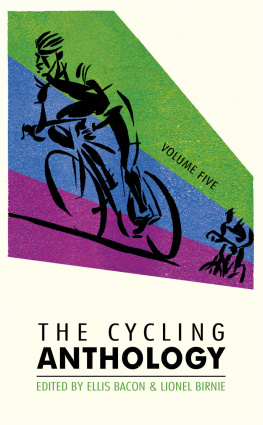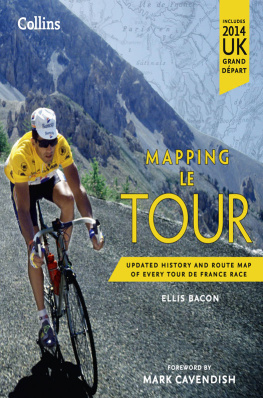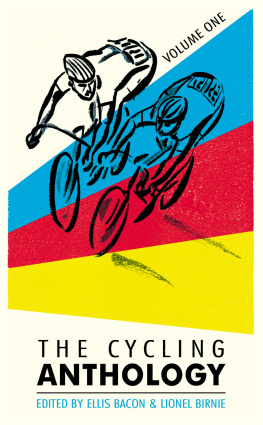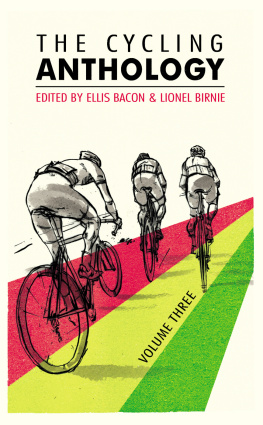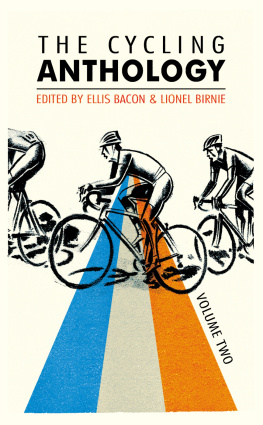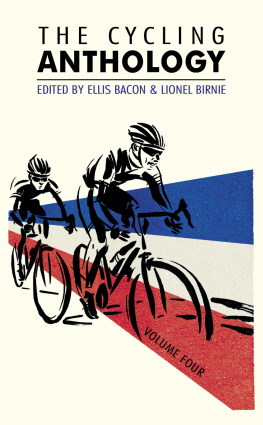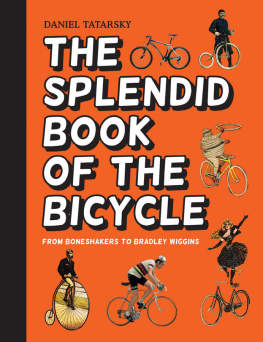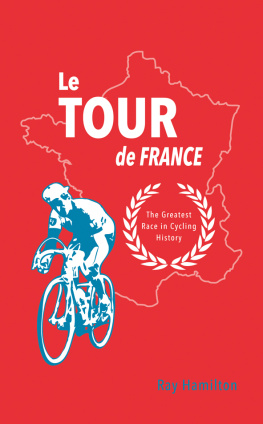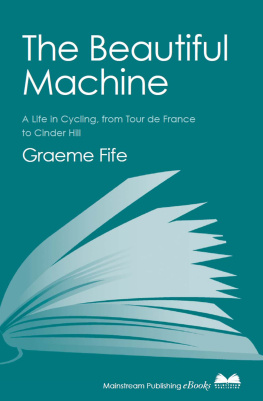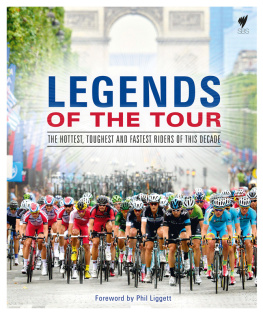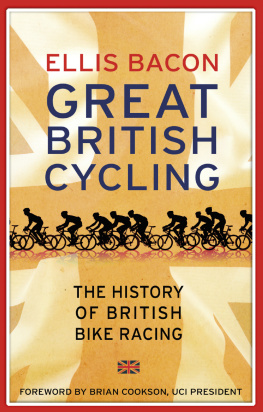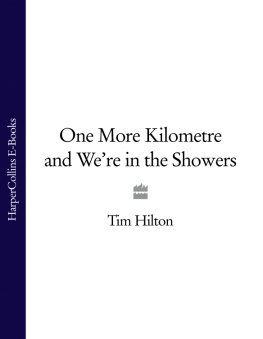CONTENTS
THE NEUTRALISED ZONE
INTRODUCTION BY THE EDITORS
SOLDIERS OF THE ROAD
BRENDAN GALLAGHER
Cyclings war heroes and the role of the bicycle in World War One
IN SEARCH OF PANACHE
JEREMY WHITTLE
Why you dont have to be a winner to be a winner in the publics eyes
INTO THE OPEN ERA
FRANOIS THOMAZEAU
How the Tour de France became the international event it is today
OH, TOUR!
ELLIS BACON
Reliving the 2014 Tour de France in poetry
LINDA McCARTNEY ON TOUR
LIONEL BIRNIE
The story behind what could have become one of Britains best-ever cycling teams
THE MYSTERY OF JOEY McLOUGHLIN
ANDY MCGRATH
What ever happened to one of the biggest stars of 80s and 90s British cycling?
SUPERBAGNRES
EDWARD PICKERING
A return to one of cyclings greatest Pyrenean climbs
THE SOUNDS OF CYCLING
MATT BEAUDIN
The Tour de France is a treat for the senses albeit a loud one
TREADING THE BOARDS
MATT MCGEEHAN
Wish you were here a postcard from the 2014 track World Championships in Colombia
THE COGNAC SALESMAN AND THE CONMAN
DANIEL FRIEBE
Meet Jean Franois Naquet-Radiguet: Tour de France pioneer

This ebook is copyright material and must not be copied, reproduced, transferred, distributed, leased, licensed or publicly performed or used in any way except as specifically permitted in writing by the publishers, as allowed under the terms and conditions under which it was purchased or as strictly permitted by applicable copyright law. Any unauthorized distribution or use of this text may be a direct infringement of the authors and publishers rights and those responsible may be liable in law accordingly.
Version 1.0
Epub ISBN 9781448191635
www.randomhouse.co.uk
Published by Yellow Jersey Press 2014
2 4 6 8 10 9 7 5 3 1
Copyright Peloton Publishing 2014
Each author has asserted their right under the Copyright, Designs and Patents Act 1988 to be identified as the author of their work
First published in Great Britain in 2014 by
Yellow Jersey Press
Random House, 20 Vauxhall Bridge Road,
London SW1V 2SA
www.vintage-books.co.uk
Addresses for companies within The Random House Group Limited can be found at: www.randomhouse.co.uk/offices.htm
The Random House Group Limited Reg. No. 954009
A CIP catalogue record for this book is available from the British Library
ISBN 9780224092425
THE NEUTRALISED ZONE
INTRODUCTION BY THE EDITORS
THE CYCLING ANTHOLOGY is now into its fifth volume a new collection of wholly original writing, as always, by some of the worlds top cycling writers, whose names youll no doubt recognise from magazines, newspapers and websites.
While our contributors come from all over the world Europe, South America, Australia, North America the Anthology nevertheless remains a predominantly British product simply by virtue of the fact that it was conceived in Britain, and is put together, edited and printed in Britain, too.
The United Kingdom enjoyed hosting two of the three Grand Tours in 2014: first, the start of the Tour of Italy in Belfast and Armagh in Northern Ireland, followed by the Tour de Frances Grand Dpart in Yorkshire.
Both events were a phenomenal success, but British riders didnt have as charmed a season as theyd had the previous couple of years. At the Tour de France, in particular, we saw the UKs biggest names either not start or crash out of the race, and fans instead enjoyed the almost phoenix-like re-emergence of French riders. And that has been reflected in the Anthology by the inclusion of a native French-speaking writer Franois Thomazeau for the first time.
Let us hope that our net of contributors will be thrown even wider in future, and that bike racing, too, continues to seek out and discover new places, faces, fans and races.
Enjoy the read.
Ellis Bacon & Lionel Birnie
In 2014, the centenary of the start of the First World War forced people to remember the fallen, and reflect on the futility of war.
The First World War was also responsible for the deaths of three Tour de France winners Lucien Petit-Breton, Franois Faber and Octave Lapize while countless other champion cyclists were also to lose their lives while fighting for their countries.
recounts some of their stories, and takes a closer look at the role the bicycle played during the war.
SOLDIERS OF THE ROAD
BRENDAN GALLAGHER
HISTORIANS BROADLY ACCEPT that approximately 10 million soldiers and 7 million civilians died in the First World War, while there were a further 20 million soldiers and civilians injured: appalling statistics that take no account of the estimated 20 million exhausted souls who then perished in the Spanish flu pandemic that swept the globe at the end of hostilities.
Against such a tidal wave of death and destruction, some may consider it a frivolous exercise to examine the contribution of one small sector of society cyclists to such a scene of devastation, and they may well be correct.
I take the view, however, that systematically looking at the smaller picture in fact, hundreds upon hundreds of smaller pictures offers perhaps the only real chance of glimpsing the bigger picture, which is impossible to take in at first glance.
The year 2014 has been nothing if not a monumental and sobering learning experience for those generations fortunate enough never to be touched by a world war. How blessed we are. I am sitting down to pen this early in August on the hundredth anniversary of the outbreak of the First World War and, even as a history graduate, I am appalled at my ignorance of that war. I have sat and passed exams on the subject, but learned next to nothing. I had no idea, until I came across a brilliant BBC2 documentary about the massive role played by African and Asian conscripts from the various empires British, French and Belgian, in particular who were thrown into the worst excesses of the Western Front from day one. Cannon fodder, literally.
Equally, I was ignorant of the fact that, for the majority of the war, British Forces snootily turned their backs on volunteer women nurses from these islands looking to treat our brave boys behind the trenches, and that many ended up caring instead for the French, Belgian and other allied troops. They never taught us that at school. In a real sense, many of us are only truly discovering the First World War now, and in that respect you can never have too much investigation and knowledge. We cant change a damned thing, but we can remember and commemorate and that process should never stop.
Until this summer of learning, I still only had the vaguest idea of how many big-name cyclists were involved in the First World War. Some fought and perished no fewer than three Tour de France winners were killed, while others survived, although the quality of life they were left with was often nearly as bad as death itself. The most robust of them were back racing just months after the madness ended, finding solace in the familiarity of old haunts and the rhythms of a daily routine that did not involve death and maiming.
I had never realised the important role of the cycling regiments, with their couriers, scouts, messengers and highly mobile combatants, especially early in the war, before mechanisation took a grip. Flicking through one of the many superb coffee-table publications that have heralded the centenary, I noticed a striking picture with a pile of five bikes hastily thrown to one side of a field in the mud, as you would before a pick-up football match down the park on a summers evening, which puzzled me until my eyes tracked right and there were five British soldiers crouched in a thick hedgerow, their rifles aimed in the general direction of the Germans. To my inexpert eyes, they looked like the conventional civilian roadsters those same youngsters might have ridden doing their butchers or grocers rounds back in Britain five or six months earlier. It was a strangely haunting image that close proximity between normality and insanity.
Next page
